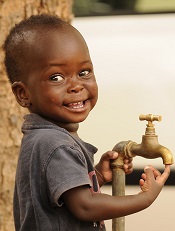
Photo by Sarah Mattison
Combination therapy with artesunate and mefloquine can safely and effectively treat children younger than 5 years of age with uncomplicated, Plasmodium falciparum malaria, according to a phase 4 study.
Researchers compared the artesunate-mefloquine combination with artemether-lumefantrine in a group of malaria-infected children in Africa.
Both combinations produced a cure rate of about 90%, and the rates of side effects such as vomiting and neurologic events were similar.
These results were published in The Lancet Infectious Diseases.
The study included 944 African children, ages 6 months to 5 years, who tested positive for malaria.
Roughly half the children were assigned to treatment with artemether-lumefantrine (n=472), and the other half were assigned to artesunate-mefloquine (n=473). Both groups were treated for 2 or 3 days, with doses adjusted for age, not weight.
At 63 days of follow-up, the cure rates were similar between the treatment groups—89.7% for artemether-lumefantrine and 90.9% for artesunate-mefloquine. For both groups, no parasites were found in the blood at 72 hours after the start of treatment.
The rates of malaria recurrence were similar between the groups. Reinfection occurred in 43.8% of patients in the artesunate–mefloquine group and 43.0% in the artemether–lumefantrine group. Recrudescence occurred in 3.9% and 4.4%, respectively.
There were no psychiatric events in either treatment group, and the rates of neurologic events were low—2.1% in the artesunate-mefloquine group and 1.1% in the artemether-lumefantrine group.
The incidence of vomiting was 15.3% in the artesunate-mefloquine group and 16.8% in the artemether-lumefantrine group. Vomiting was a focus because it lowers patient adherence and limits how much of the medicine is absorbed.
The researchers noted that artesunate-mefloquine is not used in Africa at present, even though it’s 1 of the 5 artemisinin-based combination therapies approved for malaria treatment by the World Health Organization.
The team said the results of this study support the deployment of fixed-dose artesunate–mefloquine in young children in Africa. And the findings should have important implications for health policy in sub-Saharan Africa.


